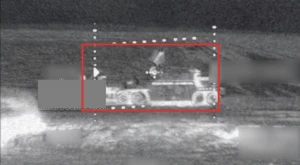
Hungary holds former Ukrainian POWs captive – human rights commissioner
Ukrainian ombudsman, Dmytro Lubinets, accused the Hungarian side of holding captive the Ukrainian servicemen transferred to the country by Russia
The Ukrainian parliament Commissioner for Human Rights, Ombudsman Dmytro Lubinets, made the statement speaking on the air of the national telethon, Ukrinform reports.
“In reality, they are isolated, have a small circle of friends and family, and their cell phones have been taken. We are aware that some were visited by family members. Again, there are no specifics about the communication's format or duration available to us,” the ombudsman stated.
In response to the question of what Ukraine is doing to facilitate the return of these soldiers, Lubinets stated that Ukrainian diplomats have a major role in the matter.
"We are attempting to contact eight former prisoners of war who are Ukrainian citizens. We are aware of their location, but we cannot understand Hungary's position and the delay in allowing our diplomatic representatives to visit them. The Verkhovna Rada Commissioner for Human Rights stated.
"And we don't know why these residents of Ukraine, who are on Hungarian soil, are actually in the same condition as prisoners of war,” he added.
He pointed out that Hungary had violated international humanitarian law because it is impossible to simply take Ukrainian prisoners of war from Russian territory without agreeing this with Ukraine.
Although the Ukrainian soldiers are no longer considered prisoners of war legally, the Ombudsman claimed that Hungary still considers them as such:
“I don't understand why they impose restrictions on them. They are free citizens. They have not committed any criminal offenses. We do not know why Hungary does not allow Ukrainian diplomats to visit them."
Information available regarding the transfer of Ukrainian prisoners of war to Hungary
On June 9, the Russian Orthodox Church announced that it had handed over a group of Ukrainian prisoners of war to Hungary. The Ukrainian intelligence service said it had no knowledge of this. International organizations, including the Red Cross, also had no relevant information.
Later, Hungary confirmed the transfer of 11 prisoners of war, noting that it was a "gesture of goodwill" on the part of the Russian Orthodox Church. Hungarian Deputy Prime Minister Zsolt Semjén confirmed to ATV that 11 prisoners of war have been transferred from Russia to Hungary. These are Transcarpathian Hungarians.
Ukraine's Foreign Ministry summoned the Chargé d'Affaires of Hungary to provide explanations.
On June 16, Commissioner for Missing Persons Oleh Kotenko said that Ukraine had established the whereabouts of 11 prisoners of war. A few days later, it was reported that the Ukrainian Foreign Ministry demanded that a consul be allowed to visit them. At the same time, Budapest continued to disregard the rights and fundamental freedoms of people and ignored all attempts at constructive dialogue with the Ukrainian embassy.
On June 19, the Ministry of Foreign Affairs of Ukraine noted that, together with the Coordination Headquarters for the Treatment of Prisoners of War and other involved bodies of Ukraine, "they continue to take active measures to return home allegedly 11 Ukrainian prisoners of war, whom Hungary, without the knowledge of the Ukrainian government or international human rights organizations, took out of Russia."
"All attempts by Ukrainian diplomats in recent days to establish direct contact with Ukrainian citizens have been unsuccessful. This, as well as information received from the families of some of them, indicates that the assurances of the Hungarian authorities about the allegedly free status of Ukrainian defenders in Hungary are not true. In fact, they are being held in isolation, do not have access to open sources of information, their communication with families takes place in the presence of third parties, and they are denied contact with the Ukrainian embassy," the Foreign Ministry said.
On June 19, European Commission Spokesperson for Foreign Affairs and Security Policy Peter Stano said that Hungary should explain its actions regarding the transfer of Ukrainian prisoners of war from Russia and its communication on this issue.
On June 20, Ukrainian Foreign Minister Dmytro Kuleba said that 11 Ukrainian prisoners of war were taken from Russia in the interests of Hungarian Prime Minister Viktor Orban. His Hungarian counterpart, Peter Szijjarto, denied Kuleba's words, rejecting the government's involvement in the exchange. According to him, the transfer of Ukrainian prisoners to the Hungarian side took place as a result of "discussions between the church and religious organizations."
The Hungarian opposition clearly denied that the agreement on the POWs release took place without the government's involvement. Commenting on Szijjarto’s statement, opposition leader Péter Márki-Zay recalled that Deputy Prime Minister Zsolt Semjén was involved in the process, which the latter confirmed publicly.
On June 21, Ukrainian Parliament Commissioner for Human Rights Dmytro Lubinets said that Hungary had violated international law and the rights of Ukrainian prisoners of war when it accepted prisoners of war from Russia.
- News















































